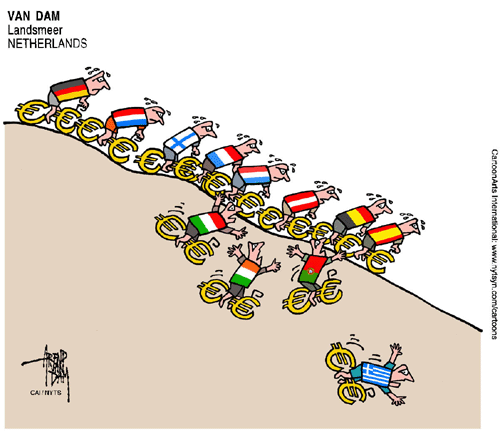There is still no agreement on bailing out Greece as Greek Premier Lucas Papademos failed to get his government’s coalition parties to agree to the severe austerity terms set out by the European Commission, European Central Bank and International Monetary Fund:
After five hours of discussions, the three leaders of Greece’s national unity government had not accepted demands by international lenders for immediate deep spending cuts and labour market reforms as part of a new medium-term package.
Mr Papademos said the political leaders had agreed on some “basic issues”, including making spending cuts this year of 1.5 percentage points of gross domestic product, or about €3bn, according to a statement from his office. [..]
The talks with the three leaders of a national unity government came after the government failed to persuade the so-called “troika”- representatives of the European Commission, European Central Bank and International Monetary Fund – to ease conditions for the rescue deal.
Patience with Greek politicians has evaporated among its creditors. During a conference call on Saturday, eurozone finance ministers bluntly told Athens to deliver on its promises and agree to reforms or face default next month.
David Dayen at FDL News Desk points out that the Greeks are being asked to destroy themselves for a bailout and calls the terms “insane”:
The deal calls for Greece to run a primary budget surplus (not counting interest payments on debt) in 2013 of over 2% of GDP, rising to over 4% by 2014. That implies massive cuts to public spending in the middle of a 5-year recession, if not a depression. As Antonis Samaras, leader of the New Democracy Party, told the Financial Times, “They’re asking for more recession than the country can take.” Samaras also has highlighted that the troika seeks cuts in private sector wages as part of the deal, of up to 25%. There would also be a 35% cut in supplementary pensions.
Trying to pressure for a settlement that many Greek leaders feel would damage the Greek economy and prolong the five year Greek recession, French President Nicholas Sarkozy and German Chancellor Andrea Merkel issued statements and made a proposal that would reassure creditors:
Nicolas Sarkozy, French president, and Angela Merkel, German chancellor, also proposed that a special closed account be created for the interest due on Greek debt to reassure creditors that they would be paid.
“The situation of Greece has to be fixed once and for all,” Mr Sarkozy said after the two leaders met in Paris. He said the terms of a bail-out deal were “on the table” and called on all the main political leaders urgently to back them, adding “time is running out”.
“Our Greek friends must take responsibility and vote for the reforms to which they are committed. This concerns everybody – the prime minister, the leader of the socialist party and the leader of the [centre-right] New Democracy party.”
Ms Merkel added: “We want Greece to stay in the euro … but I also say there can be no new Greek programme if agreement is not reached with the troika [European Commission, European Central Bank and International Monetary Fund]. All those who bear responsibility in Greece must know we will not deviate from this position.”
She added: “Time is running short. A lot is at stake for the entire eurozone.”
The stalemate had its effect on stock markets today with US stocks taking a dip
The three major U.S. stock market indices retreated slightly on Monday as investors continued to await the outcome of a potential Greek sovereign debt deal with private creditors. At 2:30pm Eastern Time, the Dow Jones Industrial Average (DJIA) had lost 40 points, or 0.3 percent, to 12,822 while the NASDAQ Composite had backed down 0.2 percent to 2,899. Meanwhile, the S&P 500 was down 0.2% to 1,342 points.
The austerity measures have already caused a 6% drop in the GDP which increases the debt to GDP ratio. the last thing Greece needs, or for that matter Europe,is more austerity.

 The robust economy of Germany is starting to feel the effects of the economic crisis of its partner nations in the Eurozone and is
The robust economy of Germany is starting to feel the effects of the economic crisis of its partner nations in the Eurozone and is  The deadly deadly out break of food poisoning in Germany has supposedly been traced to its source, bean sprouts that were grown at an organic farm in Germany. Over 3000 people have been sickened, many of them seriously, and 31 one deaths have been attributed to this contamination. According to the article in the NYT, even though there has been no harmful bacteria found in the sprouts, Reinhard Burger, the head of the country’s disease control agency said:
The deadly deadly out break of food poisoning in Germany has supposedly been traced to its source, bean sprouts that were grown at an organic farm in Germany. Over 3000 people have been sickened, many of them seriously, and 31 one deaths have been attributed to this contamination. According to the article in the NYT, even though there has been no harmful bacteria found in the sprouts, Reinhard Burger, the head of the country’s disease control agency said:
Recent Comments